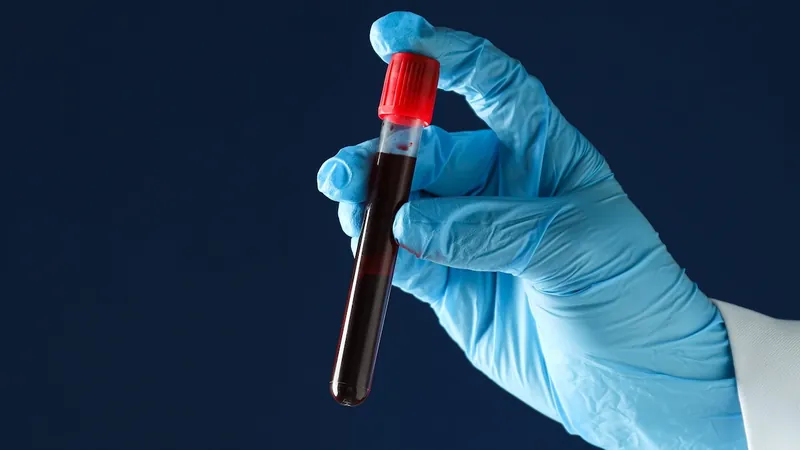
Revolutionary Blood Test Detects Cancer Recurrence Months Ahead of Scans
2025-06-05
Author: Arjun
Early Detection: A Game Changer for Cancer Patients
Five years ago, Jennifer Feenstra, a 59-year-old retired graphic designer and fitness enthusiast from Stamford, Connecticut, faced a shocking diagnosis: advanced lung cancer. Rather than dwelling on how this could happen to her—a non-smoker—she decided to battle the disease head-on. After undergoing surgery to remove part of her lung and enduring four grueling rounds of chemotherapy, Jennifer has remained cancer-free, but she knows scans can miss a recurrence until it’s too late.
Introducing the Breakthrough Blood Test
Traditionally, cancer markers have been identified through blood tests, but newer innovations have taken this further. Scientists are now homing in on tiny fragments of cancer DNA circulating in the bloodstream, a technique termed circulating tumor DNA (ctDNA) analysis. Researchers at Yale have discovered that this cutting-edge test can identify cancer recurrence, on average, five months before it shows up on traditional monitoring scans.
Jennifer expresses enthusiasm for this advancement, saying, "If this test were available to me, I would absolutely want to use it! It could be pivotal in improving my prognosis."
Liquid Biopsies: The Future of Cancer Surveillance
The market for liquid biopsies—blood tests that detect cancer—could soar to $20 billion in just a few years. These tests primarily focus on cancers such as lung, breast, and colorectal, responding to the rising tide of global cancer diagnoses. The aim is to personalize treatment for each patient, enabling doctors to swiftly adapt therapies based on real-time data.
Roy Herbst, deputy director of the Yale Cancer Center, states, "This technology is groundbreaking as it allows us to monitor treatment outcomes in real-time." By detecting recurrence earlier, physicians could potentially extend medication duration or adjust treatment plans for better outcomes.
Caution: The Need for More Research
Despite the excitement, experts caution that these tests are not yet ready for routine clinical use outside of research settings. "There’s still much to learn, particularly regarding potential harms and how these tests influence patient survival rates," cautions Herbst.
Understanding the Science Behind ctDNA
Cancerous tumors evolve genetic mutations as they grow, and this valuable data is key to crafting personalized tests. By sequencing both a patient’s tumor and their genome, researchers can pinpoint specific mutations that indicate the presence of cancer DNA in the blood. Each test targets an individualized set of mutations, which varies from patient to patient.
Risks: The Dark Side of Early Detection
While early detection sounds promising, studies have shown that patients who test positive for early recurrence typically face poorer prognoses. Positive ctDNA results can foreshadow aggressive cancers that are more likely to return swiftly. Furthermore, the consequences of acting on these tests—like unnecessary additional treatments—can be severe. One study indicated that patients flagged for residue of cancer post-surgery were often spared futile chemotherapy without increased recurrence.
The Path Ahead: Balancing Benefits and Risks
As research progresses, the role of ctDNA tests in cancer treatment will likely become clearer. Critics like H. Gilbert Welch highlight the need for randomized clinical trials to determine if earlier intervention indeed improves survival rates. Unraveling these intricacies will help both patients and physicians navigate the emotional and financial implications of testing. While the promise of ctDNA analysis is significant, the real question remains: Does this technology ultimately lead to longer, healthier lives for patients?



 Brasil (PT)
Brasil (PT)
 Canada (EN)
Canada (EN)
 Chile (ES)
Chile (ES)
 Česko (CS)
Česko (CS)
 대한민국 (KO)
대한민국 (KO)
 España (ES)
España (ES)
 France (FR)
France (FR)
 Hong Kong (EN)
Hong Kong (EN)
 Italia (IT)
Italia (IT)
 日本 (JA)
日本 (JA)
 Magyarország (HU)
Magyarország (HU)
 Norge (NO)
Norge (NO)
 Polska (PL)
Polska (PL)
 Schweiz (DE)
Schweiz (DE)
 Singapore (EN)
Singapore (EN)
 Sverige (SV)
Sverige (SV)
 Suomi (FI)
Suomi (FI)
 Türkiye (TR)
Türkiye (TR)
 الإمارات العربية المتحدة (AR)
الإمارات العربية المتحدة (AR)